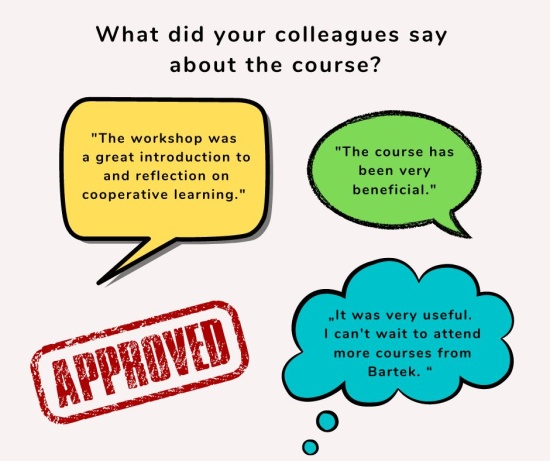Cooperative learning is an approach that is based on natural human interactions in which students work together to solve problems, thereby improving not only their knowledge but also social skills. They are encouraged to divide roles, plan their work, divide subtasks, support each other, resolve conflicts, combine sub-results into a larger whole, evaluate the contribution of individual members, etc. Despite its benefits, cooperative learning is still underutilized in classrooms, even though collaboration is common outside school, especially at work. The classroom environment should mirror these collaborative efforts to facilitate knowledge exchange and skill development.
This course focuses on cooperative learning strategies that emphasize group collaboration and interaction among learners. Participants will learn about the basic principles and structures of cooperative learning, learn how to apply them in the classroom, and recognize common mistakes in the design of these activities. The course offers practical examples of how to incorporate this learning strategy into the classroom to develop learners' key competencies and improve their learning outcomes. Suitable for teachers who want to enrich their pedagogical approaches and effectively engage learners in the learning process.
During the workshop we will try to answer the following questions:
What is cooperative learning? What are its essential elements?
How to plan and support cooperative learning?
What are the most commonly used structures of cooperative learning?
How to form groups?
The course has already taken place in the current semester, but you can express your interest in participating below. We will take your interest into account when planning the next semester.
The course develops competences falling under Pillar 1 (Learning and teaching planning and design) and Pillar 2 (Managing the learning and teaching process) of the Framework for Effective Teaching at CU. In particular, it focuses on the following competences falling under Pillar 2:
The teacher utilizes a variety of strategies that promote student active learning.
The teacher guides students to take responsibility for their own learning.
The course is designed for those with English language proficiency at B2 level or above.
Participants define the basic principles of cooperative learning and are able to apply these principles to reflect on and improve their own teaching.
Participants analyze both the positive and negative effects of incorporating cooperative learning into their teaching.
Participants describe the basic structures of cooperative learning and are able to select those that best contribute to achieving expected learning outcomes.
Participants can identify common mistakes that teachers make when designing cooperative learning activities.
Participants distinguish between lower- and higher-order thinking skills and can incorporate this knowledge into the design and implementation of cooperative learning activities in their teaching.
Mgr. Bartłomiej Wróblewski
He graduated from Kazimierz Wielki University (Bydgoszcz, Poland) with a master’s degree in English Philology and a postgraduate degree in Pedagogy. He currently works as an educational developer at Charles University in Prague and is the vice-chair of the Paedagogium platform. He is involved in the development and coordination of the training system for academic staff and PhD students in the field of pedagogical competences. He contributes to improving the quality of academic teaching at Charles University through his involvement in various projects. He is responsible for coordinating the establishment of Teaching and Learning Centres at Charles University. He is also the co-author of the Framework for Effective Teaching at Charles University.
